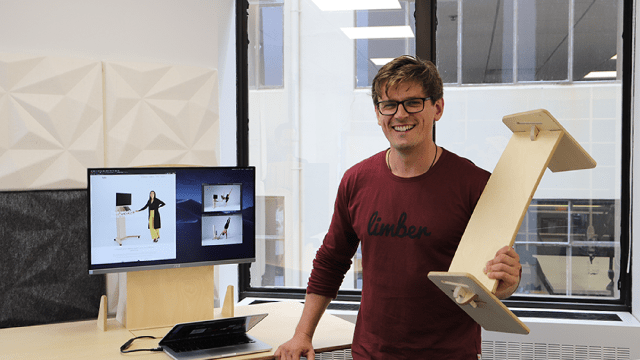Named “The world’s healthiest desk” by professors of design and architecture at UC Berkeley, Limber Desks are a New Zealand Made revolution moving the world.
Limber is a full personal workspace system dedicated to improving your health and performance while you work through making more movement faster, easier and more attractive.
As a physiotherapist, Limber founder Bart de Vries, got off the tools and was looking at a preventative way to improve people’s health and well-being.
“The thing with the desk is it doesn't allow us to move. That's fundamentally the problem. Our bodies need movement to function. All of our bodily systems require movement, to process everything that's going on. And our brains need more movement to be stimulated so that we can be productive, creative and perform as well as stay healthy over time,” Bart said.
Turning the problem into a solution
Unsatisfied with desks not offering the range of motion he was after, Bart got together with a group of friends who are engineers, civil engineers, industrial designers and experienced designers, explained the problem and created the boundaries of the design.
Bart explained, “We built our first miniature cardboard one version in that meeting with some sellotape as a counterweight and chopsticks as the frame. And we started to kind of get momentum week on week with that. And so we went through an iterative design process where we made these prototypes, first one miniature cardboard, second one was a full sized cardboard.”
Bart got testing, working with teams at Xero, Trade Me and Dev Academy to get different perspectives on their desks and how they were being used in a tech environment.
“We just iterated and iterated and iterated and used all of that feedback and all of that user experience to really build out the ultimate experience.”
Ensuring sustainability
Ensuring the desks were sustainable, was something else incorporated into the design process.
“Making sure that we're making things to last for long periods, making sure that we're making them easy to fix should they ever break and making sure that we're trying to make as locally as possible to reduce the kind of the carbon emissions and impacts it would have from the desks, as well as being able to embed in the local community and have a direct feedback loop into our local communities is really important to us,” said Bart.
While the first desk was made out of pine from Bunnings, they then shifted into plywood and started looking across New Zealand to see what would be suitable.
Bart said, “We talked to every plywood and wood manufacturer in New Zealand, but unfortunately we didn't have anything that was up to the specs that we needed it, because most of our wood is used for construction. It's not for furniture. So we had to start looking offshore and we had to start looking for what sustainable options were out there. And we ended up using a finished birch plywood, which is grown on the northern border of Finland and Russia. It's really slow growing birchwood, takes about 30 years to grow and because of that it's extremely hard and it's that hard density and stiffness that we need for the mechanisms on our desks.”
With a local workshop in Wellington, they cut out all the parts of a flat ply sheet and transform them into a desk.
Proudly New Zealand Made
Bart said using the “New Zealand Made” Kiwi trademark alongside his locally-made desks was an easy decision.
“I think the thing that got me with the Kiwi NZ Made logo mark as well, is that Kiwi is just so iconic across New Zealand. And so it was an easy one for me to be, not only to kind of differentiate myself from the market, but also for us to stand by something we're kind of proud of.”
And the process of becoming a Kiwi trademark licence holder?
“I think in terms of the process, it was so simple and it was really quick. It was a lot less effort than I was expecting, which is really nice when you’re starting a business to find things that take less time than you've put aside for them,” Bart said.
Shop or enquire online


